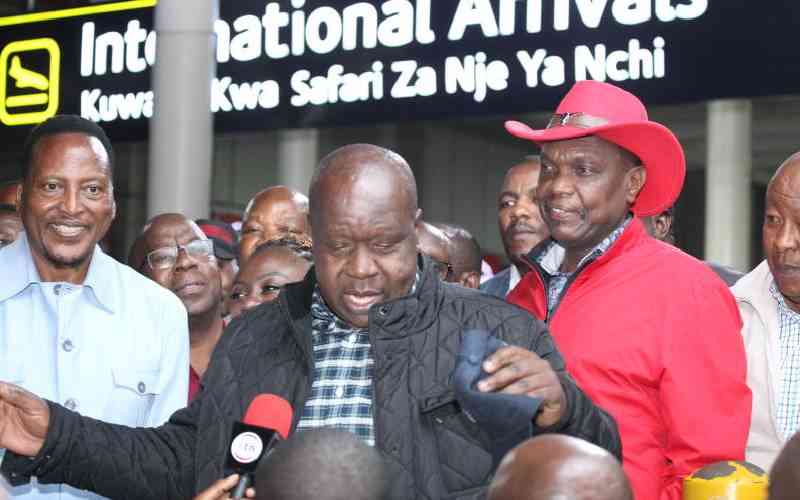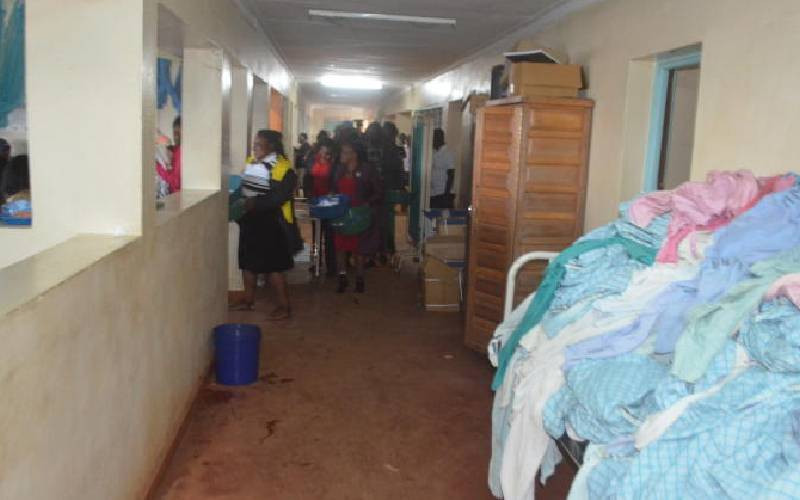 |
|
Late Prof Ali Mazrui |
Ali Mazrui and I were not social friends; and we did not always see eye to eye on politics and Art. In the analysis of African politics he emphasised ethnic conflicts where I saw class conflicts as the prime mover. But our lives interacted in the most amazing of ways. In a documentary that Dr Ndirangu Wachanga has made of the Life of the late Ali Mazrui, he asked me what I thought of my fellow countryman.
Mazrui, I said, is primarily a political scientist with a literary bent; and I, primarily a literary artist with a political bent. I knew he had this bent because, way back in the early 60s, as a guest editor of a special issue of Ghala, then the literary arm of The East African Journal, I had published one of his short stories. Later he would write the novel, The Trial of Christopher Okigbo, that would confirm this bent.
Our first international conference together was at the 1969 International Congress of Africanists in Dakar, Senegal, where, on the eve of the conference, President Sedar Senghor received us in his palace and who, on shaking my hands, told me proudly that he knew Jomo Kenyatta. The conference was attended by the leading Africanists of the time.
When it was the turn of Ali Mazrui to speak a day later, the hall was already packed, standing room only, with intellectuals from all over the world, pushing and shoving each other for space. I had seen similar crowds at his lectures in Makerere where he was the Professor of Political Science, the new wonder kid newly crowned with a PhD from Oxford, towering over a campus that once rejected his application for admission.
I had just resigned over issues of Academic Freedom from the University of Nairobi in the English Department; and it was Mazrui together with David Cook who came up with a rescue package that enabled me to teach creative writing in the English Department and a class on Pan-Africanism in the Political Science Department. It was from Makerere that Mazrui and I had jetted to Dakar for Congress of Africanists.
Asthma attack
It was on the way to Dakar that he came up with the possibility of both of us, a creative artist and he a political scientist, writing a biography of Jomo Kenyatta. The plan would later be shot down by those around the State House Nairobi but the idea was intriguing: he the first African Professor of Political Science and I the first published African novelist writing about the First President of an Independent Kenya.
It was in dark alone in my hotel room that I had my first serious attack of Asthma. I had no idea that I had this ailment; it was just that, one night, alone in my room at the hotel, I found myself unable to breathe. I remember crawling on all fours from my room down the stairs to seek help at the lobby. It was Dawn.
I hardly knew French, and they were equally, deficient in English, but somehow I managed to scribble down Mazrui’s name. It worked. They tracked him to his hotel and in no time he was with me, now a prostrate figure on the ground, fighting for every breath. Kenya had no mission in Dakar; so it was finally the British Embassy who represented Kenya’s interests who promptly managed to get me a doctor.
It was magical: one moment I was literally dying for lack of air, and the next minute, I was breathing freely normally. I was really grateful but vaguely disappointed that we had sought the offices of our former coloniser for my rescue, the way the newly independent East African states in 1964 had sought help from the same quarters to quell the African military mutinies.
Wrath of Kanu
After my one-year-stint as a Makerere Fellow in Creative Writing, Mazrui, through his good contacts with the late Gwendolen Carter of North Western University in the USA, enabled my invitation as Visiting Associate Professor of English and African Studies, there, from 1970 to 1971.
It was there where I begun writing my third novel, Petals of Blood. It was this novel together with the play, I Will Marry When I Want, that would, in 1978, have me sent to Kamiti Maximum Security Prison and later forced into exile. In the course of it, somehow, Mazrui and I had earned the wrath of the Kanu regime, I for work with the London-based Committee for the Release of Political Prisoners and he for his outspokenness on human rights abuses.
Years later he and I would return to Dakar, Senegal, as special guests of the Council for the Development of Social Research in Africa (Codesria), at their 30th conference, where we were made life members. My Honorary Doctorate from Walter Sisulu University in 2004 became special to me because Mazrui and Mandela received theirs on the same occasion.
Two Kenyan intellectuals being honored at the same time once by the prestigious research institution in West Africa, and by an African University in South Africa.
Stay informed. Subscribe to our newsletter
We leave it to political scientists to assess his legacy. But for me, taking his intellectual output as a whole, he more than lived up to the description of the global African. He made Kenya and Africa visible in the highest echelons of intellectual production.
Very heaven
To see him on the platform, quoting from poets and philosophers alike in support of his arguments, was to witness a master intellectual performer. He dined and wined and argued with Kings, Presidents, and Generals but he never lost his common touch, attentive to the voice of the student with the same respect that he gave to the Mighty. He belonged to Generations; they saw themselves in him.
I witnessed this at close quarters at the 2013 New York African Studies Conference in Binghamton to celebrate Mazrui’s 80th birthday. Intellectuals of his generation and others who could as easily have been his grandchildren gathered and read papers in his honor. Among these “grandchildren” was my 20-year-old M?umbi Wa Ngu?gi? from Harriet Wilkes Honors College of Florida Atlantic University, who gave a paper on the Politics of Silence and Agency. She opened her address by saying that there was no way she could have been left behind when it came to the celebration of a Kenyan legend and global African. Ali Mazrui sat through most of these, listening keenly to what the young had to say.
Mazrui was very fond William Wordswoth poem welcoming the French revolution, particularly the lines:
Bliss was it in that dawn to be alive/ But to be young was very heaven!
I may no talk about Heaven but it was truly bliss to have witnessed Ali Mazrui intellectual performance at the height of his powers.
He shone: he dazzled; he enlightened. Some of that bliss can be found in his numerous publications that keep his spirit alive for generations to come.
 The Standard Group Plc is a
multi-media organization with investments in media platforms spanning newspaper
print operations, television, radio broadcasting, digital and online services. The
Standard Group is recognized as a leading multi-media house in Kenya with a key
influence in matters of national and international interest.
The Standard Group Plc is a
multi-media organization with investments in media platforms spanning newspaper
print operations, television, radio broadcasting, digital and online services. The
Standard Group is recognized as a leading multi-media house in Kenya with a key
influence in matters of national and international interest.
 The Standard Group Plc is a
multi-media organization with investments in media platforms spanning newspaper
print operations, television, radio broadcasting, digital and online services. The
Standard Group is recognized as a leading multi-media house in Kenya with a key
influence in matters of national and international interest.
The Standard Group Plc is a
multi-media organization with investments in media platforms spanning newspaper
print operations, television, radio broadcasting, digital and online services. The
Standard Group is recognized as a leading multi-media house in Kenya with a key
influence in matters of national and international interest.




